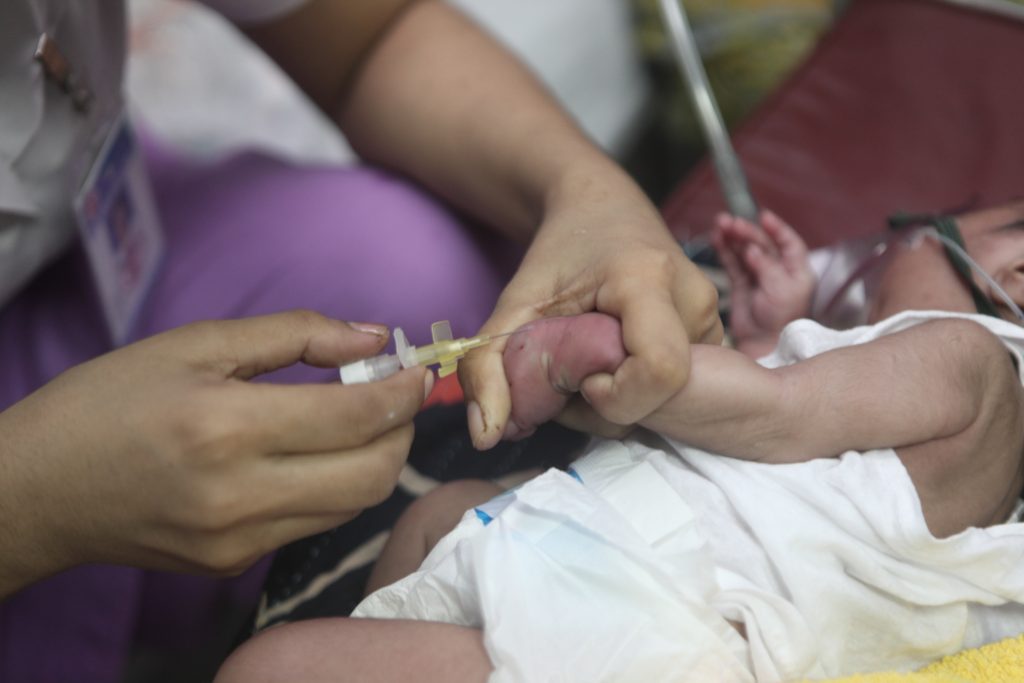
What?
We are conducting active laboratory-based surveillance and well-designed epidemiological surveys to guide decision-making by public health officials for disease prevention and control programs of typhoid fever. The aim of this project is to develop a new procedure for the laboratory confirmation of typhoid, paratyphoid or typhoid-like illness. A consortium consisting of FondationMérieux, in collaboration with Institut Pasteur, Child Health Research of Bangladesh and Fast Track Diagnotics, developed a RT- PCR assay, in combination with a sample preparation method, for the detection of S. typhi, S. paratyphiA and S. spp in blood samples from patients with suspected enteric fever.
Why?
Enteric fever due to Salmonella remains a significant public health problem, predominantly in children in developing countries. Global estimates of typhoid fever for example range from 17 to 22 million cases per year with an associated 216,000 to 600,000 deaths annually.Many developing countries are uncertain of their true typhoid disease burden, due to the lack of inexpensive rapid diagnostic tools, infrequency of laboratory testing, poor disease reporting systems, and the fact that the clinical diagnosis of the disease is often confused with other febrile illness.
Diagnosis of typhoid is always still remains as a challenge because of low sensitivity of the existing gold standard, lysis-direct plating blood culture protocol.This RT-PCR based method with a simple sample enrichment method showed promising results as it could detect significantly more cases than blood culture (44 vs 29) in children with fevers (50.2% increases). However, its acceptance is hindered by volume (5ml) of blood used, which is exceptionally high for children. Based on the preliminary data, it has been hypothesized that the sensitivity of the test with 3 ml of blood will not be dissimilar from the results with 5 ml. Thus, this project extension aims to validate this method with less volume of blood (3 ml) from children and adults from extended number of study sites (n=5) in Bangladesh. In addition, a third diagnostic test (Typhoid/Paratyphoid Diagnostic Assay), TP test will also be done in adult patient only (>18 years of age) and older children (6-17 years of age). These will allow head to head comparison among these tests, in respect of their sensitivity and specificity.
How?
The proposed supplementary study will include 4 new study sites along with the Dhaka Shishu hospital, which includes: Two primary healthcare centers in urban Dhaka and two highly populated urban slums; patients enrolled in the National Enteric Surveillance and patients from the icddr,b hospital and clinic. The 4 sites will include both children and adults. Blood samples from these 4 sites will be sent to IdeSHi/icddr,b laboratories for further processing. The Shishu hospital will continue to include patients with fever and the clinical specimens will be processed in the clinical microbiology laboratory and the CHRF in the same location.
Blood samples collected from Shishu hospital will be analyzed at the CHRF: 3-4 ml of blood will be tested for typhoid with the blood culture established in the laboratory. 1ml of blood sample will also be sent to icddr,b/ideSHI for testing with the TPTest. In parallel, 3 ml of blood will be pre-enriched in TSB/oxgall medium for 5 hours then will be kept frozen at -80°C. The frozen samples will then be sent to the Emerging Pathogens Laboratory-FondationMérieux, Lyon, France, to be tested with the real-time multiplex PCR assay.
Blood samples from Kamalapur, Mirpur, Enteric Disease Surveillance and icddrb hospital and clinic will be sent to the icddr,b (blood culture and IdeSHI laboratories (TPTest). A volume of 3-4 ml of blood will be tested for typhoid with the blood culture established in the laboratory. A volume of 1 ml will be used for the TPTest. In parallel, 3 ml of blood will pre-enriched in TSB/oxgall medium for 5 hours then will be kept frozen at -80°C. The frozen samples will then be sent to the Emerging Pathogens Laboratory-FondationMérieux, Lyon, France, to be tested with the real-time multiplex PCR assay.
The results obtained with the real-time PCR assay on 3 ml of blood will be compared to the blood culture and the TPTest results. The funds used in this project extension will validate the sensitivity of our molecular assay on 3 ml of blood, which will open possibilities for larger multicenter studies and surveillance of typhoid in developing countries.
